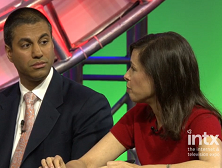INTX 2016: FCC Majority Favors More Vetting for Broadband Privacy Plan
The smarter way to stay on top of the multichannel video marketplace. Sign up below.
You are now subscribed
Your newsletter sign-up was successful

There appeared to be a majority of commissioner votes for the FCC taking more time to review its broadband privacy proposal, which drew applause from an INTX2016 crowd concerned about the impact of the framework on their business models.
That came Tuesday (May 17) at a special taping of C-SPAN's Communicators series at the INTX 2016 show in Boston, and despite the FCC's recent decision, at the bureau level, not to grant requests for an extended comment period on the proposal, which would require an opt-in regime for third-party marketing of customer data, though there is not such limitation on edge providers like Google.
The panel session Tuesday morning featured four of the five FCC commissioners--the chairman, Tom Wheeler, is scheduled for a Wednesday Q&A at the show.
C-SPAN took its Communicators series on the road for a special taping of the INTV panel session, appropriately titled "The Communicators: The FCC Commissioners on Competition, Convergence and Consumers," with host Peter Slen, senior executive producer, C-SPAN, doing the querying, along with Lydia Beyoud of Bloomberg BNA. (The show airs Saturdays at 6:30 p.m.).
Republican members Michael O'Rielly and Ajit Pai both support giving stakeholder more time top weigh in, but Democrat Jessica Rosenworcel also said Tuesday she thought it would be appropriate to have a longer proceeding.
She reminded the audience that she had said it was a complicated proceeding. "I want to point out that I was the one who pointed out there were more than 500 questions [teed up in the proposal] and I believe this is the kind of subject that is complicated and would benefit from a longer rulemaking."
O'Reilly shot back, asking why chairman Wheeler had said "absolutely not," adding: "Why won't [the chairman] listen to the three of us and agree that we should have more time on such a complicated subject."
The smarter way to stay on top of the multichannel video marketplace. Sign up below.
Rosenworcel did point to those questions as suggesting the proposal was not yet set in stone and issues like opt in and opt out were subjects on which there would be more discussion.
But while Pai conceded they were having a robust discussion about it in Boston, back in Washington he suggested it was pretty much a fait accompli.
"We will clearly talk about it," said Pai, but added: "I think it is pretty clear from FCC leadership that the writing is on the wall." He said the fact that the FCC would not give stakeholders a few extra days to submit comments" suggested minds had been made up already.
The Republicans had the same complaint about FCC Chairmen Tom Wheeler's set-top box proposal--to require MVPDs to make their programming and data streams available for re-aggregation by third-top navigation devices.
While the Democrats on the panel pointed to the fact that it had asked lots of questions, and was still a work in progress, the Republicans countered that they expected it to be voted on in essentially the same form.
Pai said that it was not a conversation the FCC had started on set-tops, but a dictation, a case of sentence before verdict in which the FCC had taken an ideological position and only gone through the formality of seeking comment on a decision that had already been made.
Asked if the FCC should pause that proceeding, as well, as some in Congress have asked while various studies are conducted on the impact of the proposal, there was certainly not push from either Democrats or commissioners for speed over contemplation.
Rosenworcel said the FCC had to take into account those requests from Congress, but also the mandate from Congress in statute to promote competitive navigation devices. She said the FCC was currently wrestling with all that.
Mignon Clyburn suggested all that wrestling—which the Republicans were clearly not conceding—was a healthy exercise in “pausing” and weighing all the input and moving forward if that was necessary "in order to improve, encourage and to sometimes push these dynamic ecosystems that we have.”
O’Rielly suggested the place for the proposal was “the garbage.”
Contributing editor John Eggerton has been an editor and/or writer on media regulation, legislation and policy for over four decades, including covering the FCC, FTC, Congress, the major media trade associations, and the federal courts. In addition to Multichannel News and Broadcasting + Cable, his work has appeared in Radio World, TV Technology, TV Fax, This Week in Consumer Electronics, Variety and the Encyclopedia Britannica.

